 NEWS: Readers want education solutions, more from 2019 session
NEWS: Readers want education solutions, more from 2019 session
BRIEFS: Floodwater commission has first meeting
TALLY SHEET: More than 700 bills on legislative calendar already
COMMENTARY, Brack: South Carolina important for 2020 contest
SPOTLIGHT: Charter Communications
FEEDBACK: Send us your thoughts and more
MYSTERY PHOTO: A Lowcountry building decked out for the holidays
S.C. ENCYCLOPEDIA: Musician Bill Pinkney
Readers want education solutions, more from 2019 session
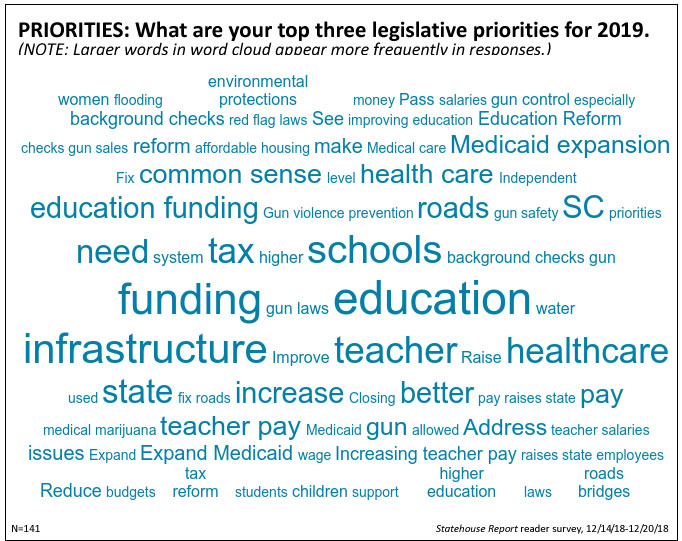
By Lindsay Street, Statehouse correspondent | A survey of Statehouse Report readers shows they, like state lawmakers, want education reform to be the legislature’s top priority in 2019.
But the survey, answered by 148 readers, showed key differences in priorities due to the publication’s engaged readership, according to one analyst. Readers want more focus also on issues like protecting infrastructure from flooding, reforming gun laws and expanding health care access
The session begins Jan. 8.
Over six days starting Dec. 14, the survey garnered 148 respondents, 40 percent of whom said they were Democrats. While only 10 percent identified themselves as Republicans, one in four said they were independents and about 20 percent simply said they were “interested in politics.” The rest did not answer indicate their political leaning.
Elizabeth S. Smith, chair of Furman University’s Politics and International Affairs Department, said a survey of readers is also likely to skew toward the “attentive public,” meaning these responders are well-informed on topics and do not typically represent the broader constituency.
Readers say state is headed in wrong direction
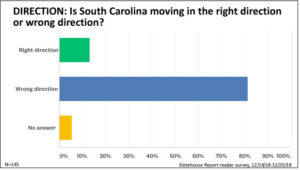 A vast majority of respondents — 81.9 percent — said the state was moving in the wrong direction. Of the 138 who answered the question, 50 issued a comment with education occurring in 62 percent of responses, infrastructure occurring in 34 percent of responses, and health care occurring in 28 percent of responses. Percentages were calculated by the number of occurrences over the number of responses.
A vast majority of respondents — 81.9 percent — said the state was moving in the wrong direction. Of the 138 who answered the question, 50 issued a comment with education occurring in 62 percent of responses, infrastructure occurring in 34 percent of responses, and health care occurring in 28 percent of responses. Percentages were calculated by the number of occurrences over the number of responses.
“Very little statesmanship evidenced in failure to properly fund education to remedy discrepancies in preparation, lack of sign on to Medicaid expansion, poor foresight in infrastructure and flood mitigation planning and funding, and failure to pass basic protections for citizens with regard to gun policies,” wrote reader Judy Hines of Charleston.
Another respondent who identified as an independent provided a similar comment:
“South Carolina needs to act to broaden health care, address infrastructure, and education. Not necessarily in that order.”
Among those who thought the state was going in the right direction, one Chapin woman said the economy was proof that the state is improving.
“Our economy is the basis of our strength. We are moving in the right direction and we are holding spending to a manageable limit,” she wrote.
Michelle Edgar of Columbia also had a rosy view of the state.
“We are getting more leaders elected that are empathetic with everyday citizens,” she wrote.
Others, such as Michele Baker of Beaufort, qualified their answer on the state’s direction.
“I chose the right direction because. in general, things tend to get better, but there are some serious problems still out there like the education system, state employee pay/benefits, offshore drilling that need to be remedied,” she said in the survey.
Challenges facing the state
More than one-third of responses from readers included mentions of infrastructure and roads as among South Carolina’s greatest challenges.
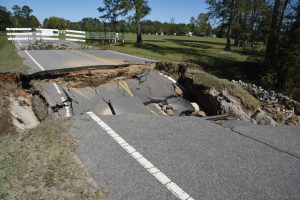
“Our roads are terrible,” one respondent wrote.
Another third of responses also listed health care as another big challenge in the state.
“We need Medicaid expansion and we need more ACA [Affordable Care Act] marketplace options,” Kristen French of North Charleston wrote.
Nearly 25 percent of responses listed teachers, education, schools or other items as challenges for the state.
“Deplorable educational statistics … poor teacher retention and embarrassing teacher pay scales,” Cyndie Geries of Hartsville wrote.
Fewer than 12 percent of comments identified environmental, flooding or climate change as a significant challenge to the state.
Hines was among those talking about climate change and the challenges for the state. She asked for “long-term planning.” Others said the state needed to find a way to reduce fossil-fuel dependency and invest in alternative energy such as solar.
Education tops legislative priorities
Furman’s Smith said the public has led the charge on pushing education to the top of lawmakers’ agendas for the coming session, and the reader survey showed similar results.
More than 73 percent of responses to a question asking respondents to list their top three priorities included mentions of education. While lawmakers and the media often sent the issues agenda in public policy debates, education hits closer to home for more people, Smith said.
“That’s the kind of issue where the public has an easier time forming an opinion themselves and can be the drivers in making the difference … With efforts by educators particularly, putting pressure on state legislature, that has been more of a citizen initiative. The public has gotten real fed up.”
Other top priorities among respondents included:
- Roads and infrastructure (30.37 percent);
- Health care, including expanding Medicaid (35.55 percent); and,
- Gun control (26.65 percent)
Redistricting, guns are top reform priorities
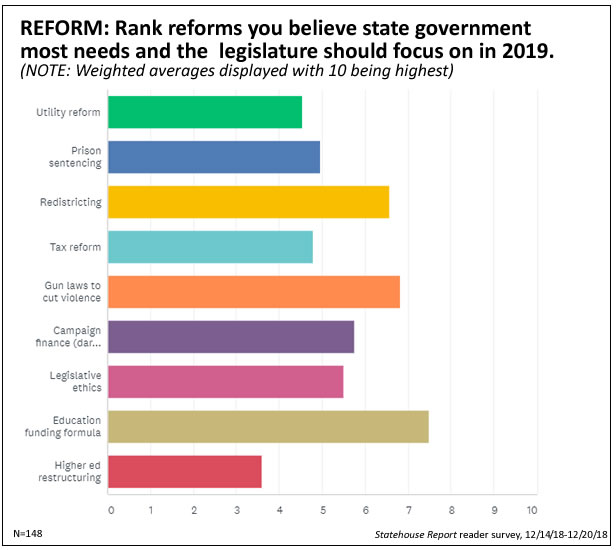
The survey then asked readers to prioritize a list of reforms the General Assembly should consider. While education, infrastructure, gun control and health care topped overall priorities redistricting reform ended up as readers’ highest reform priority.
“Fix redistricting and end gerrymandering,” one respondent wrote.
The next top reform priorities respondents identified were:
- Gun law reform;
- Education formula reform; and,
- Campaign finance reform, which includes limiting use of so-called “dark money” in politics.
Readers want more investment for education
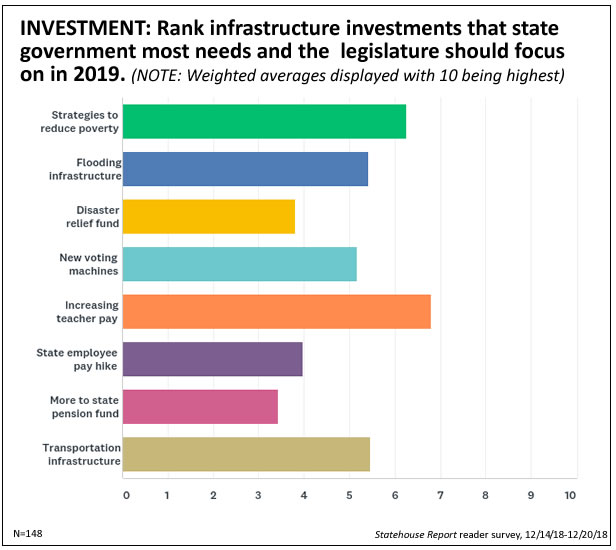
The survey asked readers to rank their main investment priorities in order of importance. Teacher pay topped their investment priorities. .
“Teacher salaries must keep pace with cost of living,” a respondent wrote. Another added, “Teacher pay is horrendous.”
- Last week, Statehouse Report’s editor and publisher called for a 5-percent pay hike for K-12 teachers. Click here to read the column.
Here are the other top investment priorities mentioned by respondents:
- Investing in strategies to reduce poverty;
- Investing in infrastructure to reduce flooding;
- Buying new voting machines; and,
- Investing more in transportation infrastructure
Politically-charged issues ranked
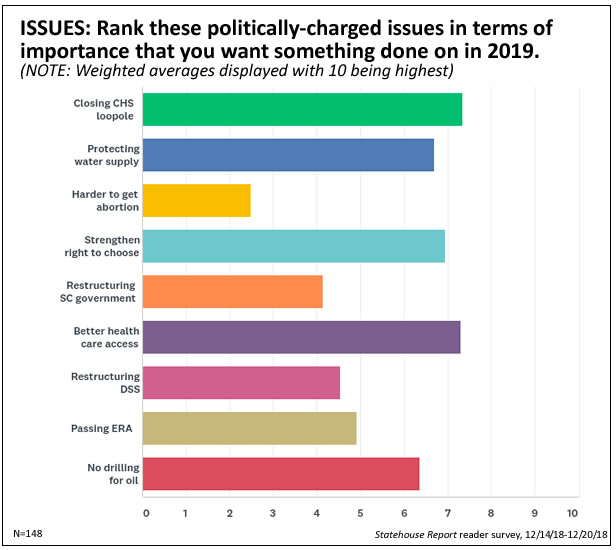
The survey also asked readers to rank their top four politically charged priorities, the things that could take up a lot of debate among lawmakers if they are brought to the floor at all.
While at least three lawmakers identified restricting abortion access as a top priority in 2019, readers seemed more interested in strengthening a woman’s ability to access abortion services. Abortion politics seems to take away from more important issues the state is facing, according to Sarah Hurst of Bluffton. She identified abortion politics among “stupid things” that take away from the focus on funding education.
Here are some other top politically-charged priorities for readers:
- Improving access to health care for poor people;
- Closing the Charleston loophole (“Strengthening our gun violence laws to prevent domestic violence murders and mass shootings,” a respondent wrote.); and,
- Protecting the state’s water resources.
- Have a comment? Send to: feedback@statehousereport.com
NEWS BRIEFS
BRIEFS: Floodwater commission has first meeting
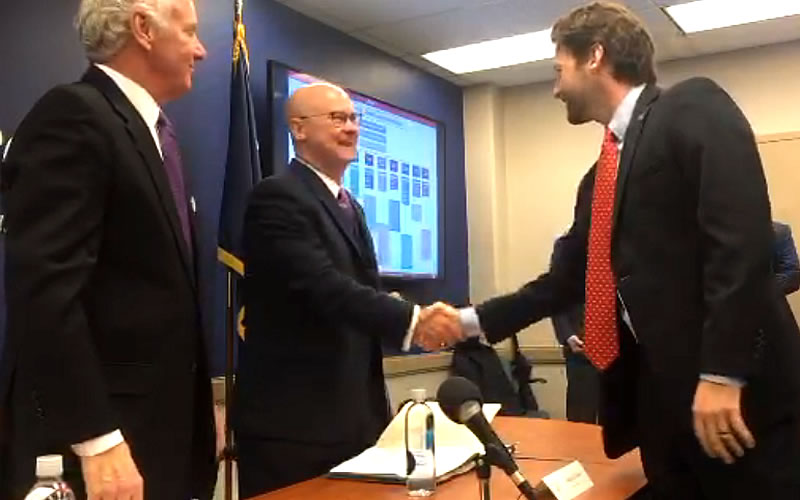
By Lindsay Street, Statehouse correspondent | The S.C. Floodwater Commission has begun organizing its 57-member team, tasked with addressing floods in the state.
The commission met this week for the first time after it was created after hurricanes Florence and Matthew by Gov. Henry McMaster. From the commission’s gubernatorial-based website:
“South Carolina faces an environmental challenge of the utmost urgency. Frequent flooding from rains, storms, hurricanes and tides threatens our people, our property and our way of life. To identify a comprehensive solution, and better facilitate a coordinated and collaborative mitigation effort, Governor McMaster has by Executive Order established the South Carolina Floodwater Commission.”
This week, the commission released a draft of 10 task forces to tackle top flooding issues in the state. Those task forces include:
- Artificial reef systems;
- Living shoreline;
- Infrastructure and shoreline armoring;
- Smart river and dam security;
- Grid security;
- Landscape beautification and protection;
- National security;
- Stakeholder engagement;
- Federal funding; and
- Economic development.
- See the recommended members for the task forces and each task force’s mission here.
The commission next meets Feb. 8 in Charleston.
In other recent news:
![]() DHEC gets new head. McMaster announced this week that Richard Toomey will lead the sprawling S.C. Department of Health and Environmental Control. The agency has been without a director for 17 months. McMaster said Toomey, a former DHEC board member, has “extensive experience” in health care and “proven success” in leading large organizations. Read Toomey’s resume here.
DHEC gets new head. McMaster announced this week that Richard Toomey will lead the sprawling S.C. Department of Health and Environmental Control. The agency has been without a director for 17 months. McMaster said Toomey, a former DHEC board member, has “extensive experience” in health care and “proven success” in leading large organizations. Read Toomey’s resume here.
Southerners surveyed by Winthrop. Winthrop released a poll of 969 Southerners this week. Respondents hailed from Alabama, Arkansas, Florida, Georgia, Louisiana, Mississippi, North Carolina, South Carolina, Tennessee, Texas and Virginia. The poll touched on a variety of topics. Here are a few interesting tidbits from it:
- Half of Southern residents either agree or strongly agree that America was founded as an explicitly Christian nation;
- While 80 percent of Republican or Republican-leaning Southerners approve of President Donald Trump, only 4 percent of Democratic Southerners approve of the president;
- Trump has a 44 percent approval rating among all respondents and a 48 percent disapproval rating, which is slightly higher than his national approval ratings.
- Forty-two percent of Southerners want to leave Confederate memorials alone, while 28 percent said to add a plaque for context and historical interpretation. Nearly a quarter of respondents wanted to move the statutes to a museum. That’s 56 percent of Southerners who want to do something regarding Confederate monuments and statues.
- Concerning the Confederate flag, 46 percent of Southern residents viewed it as somewhat or very unfavorable. Only one in five Southerners viewed it as very favorable. More than two-thirds of black respondents viewed the flag as a symbol of racial conflict.
- About 20 percent of Southerners said the Civil War was over states’ rights and not slavery.
- Forty percent of all respondents said race relations are poor in this country, and another 38 percent called them only fair. Two percent of white respondents and 1 percent of black respondents called race relations excellent.
- More than half of Southerners said our country is headed in the wrong direction, but 77 percent of respondents said our country’s economy as a whole is very good or fairly good and a majority said it is getting better.
- The most important problem facing our country, according to those surveyed, is immigration, followed by politicians/government, racism, lack of healthcare and the economy.
- Read the results here.
Baker to continue to lead at DHHS. Gov. Henry McMaster said this week that Josh Baker will continue as director of the S.C. Department of Health and Human Resources, which oversees about one-third of the entire state budget. Baker was first appointed to the position in 2017. McMaster said the Medicaid office head has been “a responsible steward” of taxpayer dollars and has demonstrated “genuine compassion” in the role. The press release said that under Baker’s tenure, there was an 8 percent drop in the infant mortality rate in 2017, and an increase in children served by BabyNet by 10.4 percent.
Santee Cooper program saves customers money. Reduce The Use programs have save state-owned utility Santee Cooper customers more than $250 million since 2008. That means customers are saving 209 gigawatt hours a year, an energy savings goal the utility reached two years ahead of its 2020 target. In other Santee Cooper news …
Attorney general questions Santee Cooper’s legal fees. The state-owned utility has spent nearly $850,000 for attorneys for its executives and Attorney General Alan Wilson asked this week for the utility to stop those payments, citing constitutional concerns. Read more.
Looking ahead
Click below for other items coming up in the Statehouse:
- House calendar
- Senate calendar
- Have a comment? Send to: feedback@statehousereport.com
TALLY SHEET: More than 700 bills on legislative calendar already
Staff reports | Talk about a full calendar. With Tuesday’s pre-filing of more than 440 new bills added to the 298 entered into the hopper last week by the Senate, legislators have more than 740 bills to consider before they even show up to work when the session starts Jan. 8.
![]() This week in the House, just like last week in the Senate, lawmakers pushed reform of the state’s education system as a top priority. In a letter to House Speaker Jay Lucas, Greenville legislators want work in 2019 that will focus on “root problems in finance structure, accountability and equity of opportunity for our rural schools,” according to the Greenville News. Among structural initiatives were calls to simplify the state’s education funding formula, cut bureaucracy, consolidate school districts, provide more options and provide more pay flexibility for school districts.
This week in the House, just like last week in the Senate, lawmakers pushed reform of the state’s education system as a top priority. In a letter to House Speaker Jay Lucas, Greenville legislators want work in 2019 that will focus on “root problems in finance structure, accountability and equity of opportunity for our rural schools,” according to the Greenville News. Among structural initiatives were calls to simplify the state’s education funding formula, cut bureaucracy, consolidate school districts, provide more options and provide more pay flexibility for school districts.
Another proposal among 65 education bills would end some of the state’s merit-based college scholarships to allow teachers to get free of student debt, The Post and Courier reported. Bills also called for significant increases in teachers’ pay.
Other pre-filed bills included calls to prohibit offshore drilling, reform the state’s tax structure, boost the minimum marriage age and fund work on the state’s beaches.
BRACK: South Carolina important for 2020 contest
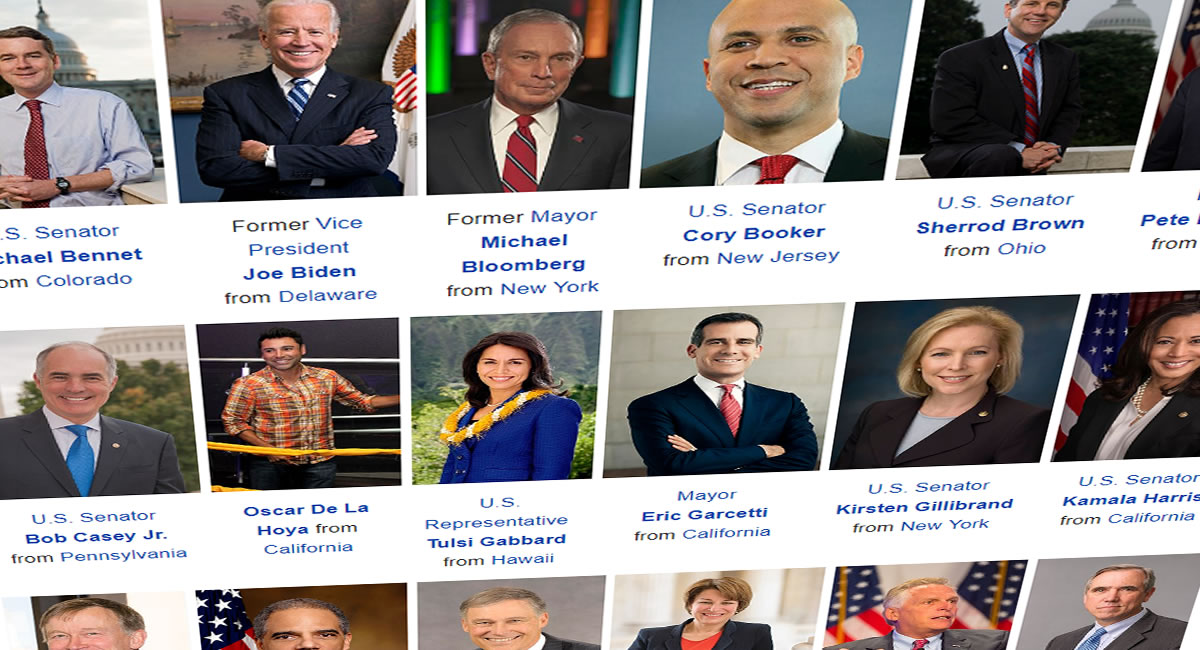
By Andy Brack, editor and publisher | South Carolina is poised to be a big player in determining the 2020 Democratic presidential contender.
 With the Palmetto State’s primary set to be in February 2020 before March Super Tuesday primaries across the country, South Carolina will be the first primary state where candidates will face off among a diverse blend of voters. Iowa and New Hampshire, the mostly white states that kick off the presidential process, don’t have the diversity that characterizes South Carolina and most of the rest of the nation.
With the Palmetto State’s primary set to be in February 2020 before March Super Tuesday primaries across the country, South Carolina will be the first primary state where candidates will face off among a diverse blend of voters. Iowa and New Hampshire, the mostly white states that kick off the presidential process, don’t have the diversity that characterizes South Carolina and most of the rest of the nation.
South Carolina is also historically more conservative than other states, which could be a good thing for the process, even for Democrats, as I related earlier in the week to an Australian journalist who called to chat about the election.
There will be all flavors of Democratic leaders running for president, from liberals like Sens. Elizabeth Warren or Bernie Sanders (who actually isn’t a Democrat) to more mainstream leaders, possibly including former Vice President Joe Biden. Just as Republicans had more than a dozen candidates in 2016, Democrats in 2020 will have a panoply from which voters can choose, potentially including big names like Sens. Cory Booker of New Jersey, Kamala Harris of California, Kristin Gillibrand of New York and Sherrod Brown of Ohio. Also mentioned have been everyone from Oprah Winfrey to two former mayors: Mitch Landrieu of New Orleans and Michael Bloomberg of New York.
But the ideal candidate, I suggested to the national reporter, would be someone who was not the “I am not Donald Trump” candidate, meaning that the best candidate likely would be someone who didn’t run on being against everything Trump is as president.
 The ideal candidate would be a Democratic moderate who would build a campaign that pulls together an unhappy, divided country while promoting a platform that pushes economic opportunity for all Americans. In other words, a unifier and economic pragmatist.
The ideal candidate would be a Democratic moderate who would build a campaign that pulls together an unhappy, divided country while promoting a platform that pushes economic opportunity for all Americans. In other words, a unifier and economic pragmatist.
A bold Democratic nominee might, for example, actually ask a moderate Republican to serve as vice president. That’s a risk, if the VP has big political aspirations that might conflict with a sitting president, but it has the potential to be a big win for a country hungry to be more than the Divided States of America.
Pundits lately have been preaching the gospel of economic populism as something the next Democratic candidate needs to have. But in a country where debt and partisanship are soaring along, doing what’s popular economically with voters might not be the medicine the country needs now.
Rather, it needs economic pragmatism – a bold, new course that blends generating economic opportunity for everyone, most of all those left out in the wealth creation of the last two decades, with practical measures that can do loads of good.
The folks at the centrist Third Way think tank might have hit on the right formula – a call to engage voters by building opportunities through a campaign based on economic policies that help people earn a good livings. Their notion blends the American value of hard work with a policy framework (building opportunity) that can be expressed in myriad ways. If Democrats are going to win in 2020, they have to express values as well as policies.
“By a 20 point margin, voters want government to focus on policies that spread opportunity to more and more people and places over addressing income inequality,” according to a Third Way treatise.
Third Way describes its opportunity agenda as creating a sweeping apprenticeship program to train workers for more sophisticated jobs, adding private retirement accounts, cutting taxes for low-income workers and developing regional minimum wage policies. They contrast their vision with a Trump-style approach to kill national health care, build a wall and engage in trade wars. And they differ with a Sanders-style agenda of Medicare for all, free college and a $15 per hour minimum wage.
When their agenda is compared with approaches by Trump and Sanders, Third Way says voters highly prefer building opportunity through work-related policies by double digit margins.
Bottom line: Combining an opportunity agenda in a pragmatic leader who focuses on unifying the country’s Democrats, Republicans and independents is exactly what the United States now needs.
- Have a comment? Send to: feedback@statehousereport.com.
SPOTLIGHT: Charter Communications
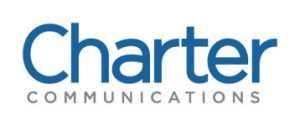 The public spiritedness of our underwriters allows us to bring Statehouse Report to you at no cost. Today, we’re happy to shine the spotlight on Charter Communications, the nation’s fastest-growing TV, internet and voice company. Committed to integrating the highest quality service with superior entertainment and communications products, Charter is at the intersection of technology and entertainment, facilitating essential communications that connect 24 million residential and business customers in 41 states, including South Carolina. In addition to being committed to giving back to the communities we serve, the bedrock of our business strategy is to serve our customers and exceed their expectations.
The public spiritedness of our underwriters allows us to bring Statehouse Report to you at no cost. Today, we’re happy to shine the spotlight on Charter Communications, the nation’s fastest-growing TV, internet and voice company. Committed to integrating the highest quality service with superior entertainment and communications products, Charter is at the intersection of technology and entertainment, facilitating essential communications that connect 24 million residential and business customers in 41 states, including South Carolina. In addition to being committed to giving back to the communities we serve, the bedrock of our business strategy is to serve our customers and exceed their expectations.
“We, at our core, are a service organization,” President and CEO Tom Rutledge says. “And every product we sell has a huge service component.”
- To learn more, visit Charter’s South Carolina services online here: https://buy.charter.com/services/south-carolina
FEEDBACK
FEEDBACK: Send us your thoughts … or rants
We love hearing from our readers and encourage you to share your opinions. But you’ve got to provide us with contact information so we can verify your letters. Letters to the editor are published weekly. We reserve the right to edit for length and clarity. Comments are limited to 250 words or less. Please include your name and contact information.
- Send your letters or comments to: feedback@statehousereport.com
MYSTERY PHOTO: A Lowcountry building decked out for the holidays
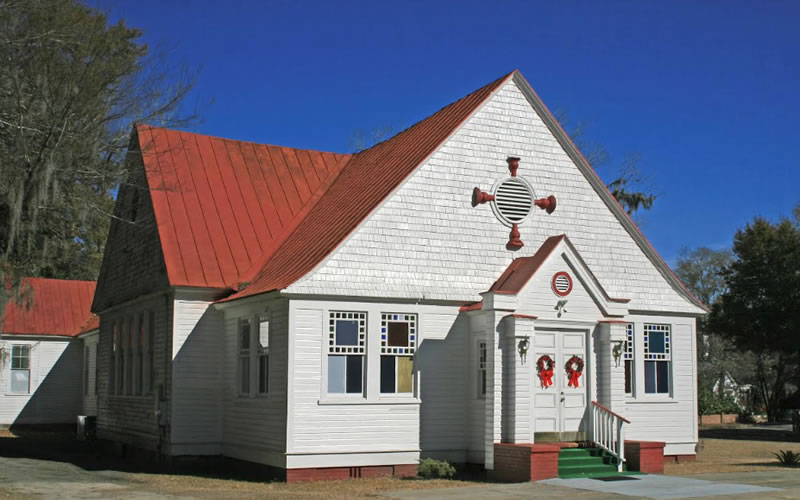
This week’s mystery comes to us from a loyal reader who said the building almost screams Christmas – even without the wreathes on the front of the building. Hint: It’s in the greater Lowcountry area and we expect it might be another tough one. You didn’t think you were going to get a “gimme” as a present, did you? Send your guess to feedback@statehousereport.com. And don’t forget to include your name and the town in which you live.
Our previous Mystery Photo
Our Dec. 14 mystery, “Best sleuthing skills might be needed,” wasn’t as tough as we thought it would be. It depicted Magnolia Cemetery in Greenwood, S.C. The church in the background, Mount Pisgah AME Church, apparently was helpful in the identification.
Congratulations and happy holidays to p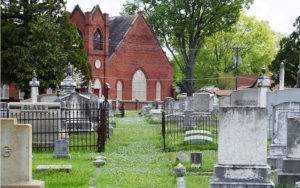 hoto detectives George Graf of Palmyra, Va.; Bill Segars and Don Clark, both of Hartsville; Dale Rhodes of Richmond, Va.; Philip Cromer of Beaufort; and Jay Altman of Columbia.
hoto detectives George Graf of Palmyra, Va.; Bill Segars and Don Clark, both of Hartsville; Dale Rhodes of Richmond, Va.; Philip Cromer of Beaufort; and Jay Altman of Columbia.
Cromer explained how he figured out where the cemetery is located: “I noticed a tombstone had the letters “BARKS” and guessed it was Barksdale. Knowing a little about genealogy in South Carolina, I knew Barksdales lived in the Charleston area and in the Abbeville, Greenwood and Laurens areas. Googled Gothic Revival Churches in the latter areas (the picture did not look to be from the Lowcountry) and found what looked very much like the Mystery Photo church.”
Segars shared some information about the church: “Pisgah was designed and built by a local brick mason and member of the church, Henry Wemmes. He had help from other skilled members of the church in completing this Gothic Revival brick building in late 1908. Mount Pisgah was placed on the National Register of Historic Places on August 16, 1979. Unfortunately, the building is currently not being used by a congregation, so the fate of it is somewhat uncertain.”
Graf also provided this information: “A couple notables in the cemetery according to hmdb.org,
“Samuel C. Hodges (1874-1957), pharmacist, partner in Lee and Hodges Drug Store 1899-1904, founder and owner of Hodges Drug Store 1904-1957, president of the South Carolina Pharmaceutical Association, Greenwood city councilman for ten years, and state senator 1929-1932.
“William V. Blyth (1854-1929), son of Andrew A. Blyth, who founded the business that became Blyth Funeral Home in 1884, the first undertaker in South Carolina to do embalming, and the first to use a motor vehicle instead of a horse-drawn carriage for a hearse.
“Thomas White Cothran was born and reared on the old plantation at Millway, and was a member of the first class that graduated from Clemson College in 1896. In that splendid institution, he received the fundamentals of his training as an engineer. For two years, he was connected with the United States Geological Survey, being on duty in Texas, Indian Territory and Iowa. On the basis of his experience and proved achievements, Thomas White Cothran of Greenwood is one of the leading civil and construction engineers of his native state.”
Send us a mystery: If you have a photo that you believe will stump readers, send it along (but make sure to tell us what it is because it may stump us too!) Send to: feedback@statehousereport.com and mark it as a photo submission. Thanks.
S.C. ENCYCLOPEDIA
HISTORY: Musician Bill Pinkney
S.C. Encyclopedia | Born on Aug. 15, 1925, in Dalzell, Sumter County, musician Bill Pinkney began singing gospel songs as a child while working in South Carolina’s cotton fields. He would go on to a stellar career performing around the globe as an original member of the Drifters. The group became a rhythm and blues (R&B) pioneer, and in 1988 members of the Drifters were inducted into the Rock and Roll Hall of Fame.
 The young Pinkney mixed his love of music with baseball, earning a pitching position with the New York Blue Sox in the Negro Baseball League. In 1949, while singing in gospel quartets, he met Clyde McPhatter, a young gospel singer who at the time was performing with Billy Ward and the Dominoes. Within two years McPhatter recruited Pinkney and brothers Gerhardt and Andrew Thrasher to form a new musical group, the Drifters. In 1953 the Drifters were offered a contract with Atlantic Records, and they eventually became, according to the label’s founder, Ahmet Ertegun, “the all-time greatest Atlantic recording group.”
The young Pinkney mixed his love of music with baseball, earning a pitching position with the New York Blue Sox in the Negro Baseball League. In 1949, while singing in gospel quartets, he met Clyde McPhatter, a young gospel singer who at the time was performing with Billy Ward and the Dominoes. Within two years McPhatter recruited Pinkney and brothers Gerhardt and Andrew Thrasher to form a new musical group, the Drifters. In 1953 the Drifters were offered a contract with Atlantic Records, and they eventually became, according to the label’s founder, Ahmet Ertegun, “the all-time greatest Atlantic recording group.”
Moving beyond their gospel origins, the Drifters became internationally famous, creating a unique sweet soul sound that expanded the R&B genre. Later members, also inducted into the Rock and Roll Hall of Fame, included Johnny Moore, Ben E. King, Rudy Lewis, and Charlie Thomas. The Drifters’ best-selling song, “White Christmas,” was recorded in 1954 and featured Pinkney as lead bass singer. In 2002, in his seventy-seventh year, Pinkney continued to perform with the Original Drifters, a permutation of the legendary group.
Though the Drifters are closely associated with Carolina beach music, Pinkney disputes the notion that the state’s popular beach sound is any different from the gospel-influenced R&B fare enjoyed in other regions. “The backbone of all R&B was created from gospel. Sam Cook did both, Otis Redding did both, and I did both,” said Pinkney. “Beach music (in the Carolinas) is a mind thing,” he said. “A song that might be called a beach song here is just R&B someplace else.”
— Excerpted from an entry by Frank Beacham. This entry hasn’t been updated since 2006. To read more about this or 2,000 other entries about South Carolina, check out The South Carolina Encyclopedia, published in 2006 by USC Press. (Information used by permission.)
ABOUT STATEHOUSE REPORT
Statehouse Report, founded in 2001 as a weekly legislative forecast that informs readers about what is going to happen in South Carolina politics and policy, is provided to you at no charge every Friday.
- Editor and publisher: Andy Brack, 843.670.3996
- Statehouse correspondent: Lindsay Street
More
- Mailing address: Send inquiries by mail to: P.O. Box 22261, Charleston, SC 29407
- Subscriptions are free: Click to subscribe.
- We hope you’ll keep receiving the great news and information from Statehouse Report, but if you need to unsubscribe, go to the bottom of the weekly email issue and follow the instructions.
- © 2018, Statehouse Report. All rights reserved.















 We Can Do Better, South Carolina!
We Can Do Better, South Carolina!